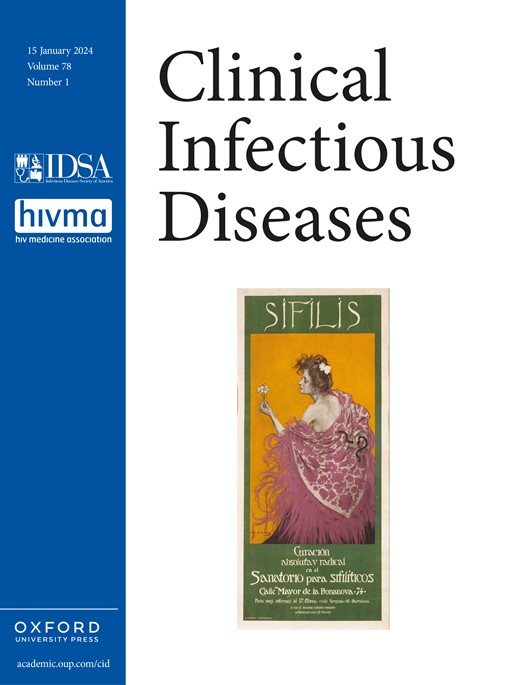IF 8.2
1区 医学
Q1 IMMUNOLOGY
引用次数: 0
摘要
背景 尽管采用了抑制性抗逆转录病毒疗法(ART),但仍有15%-30%的人类免疫缺陷病毒(HIV)感染者的CD4 T细胞恢复有限。尽管之前已在艾滋病病毒感染者(PWH)中发现了抗 CD4 受体的自身抗体,但人们对其对 CD4 T 细胞重建的纵向影响知之甚少。方法 通过液相荧光素酶免疫沉淀系统免疫测定法对抗病毒治疗无效的晚期艾滋病病毒感染者(CD4 细胞数≤100 cells/µL)、CD4 细胞数>200 cells/µL的艾滋病病毒感染者、长期非艾滋病病毒感染者、特发性 CD4 淋巴细胞减少症患者、自身免疫性淋巴组织增生综合征患者和未感染艾滋病病毒的健康志愿者中的抗 CD4 自身抗体进行了评估。在晚期 HIV 感染者中,我们评估了抗逆转录病毒疗法开始时抗 CD4 自身抗体与中位随访 192 周的 CD4 恢复之间的关系。结果 在 29%(61/210)接受抗逆转录病毒疗法的晚期 HIV 感染者中发现了抗 CD4 自身抗体,但在无 HIV 感染者中却没有发现。与男性相比,女性艾滋病病毒感染者的抗CD4自身抗体发生率高出4倍(P&P;lt; .001)。开始抗逆转录病毒疗法后,出现抗CD4自身抗体的晚期HIV感染者的CD4重建速度总体较慢(5.8 vs 6.6 cells/µL/月,P = .007),第192周的CD4计数也较低(268 vs 355 cells/µL,P = .037)。对这些参与者进行偶然的、有临床指征的免疫抑制治疗与CD4重建率的提高(P = .0019)和第192周CD4计数的升高(551 cells/µL vs 268 cells/µL,P = .019)有关。结论 开始接受抗逆转录病毒疗法时携带抗 CD4 自身抗体的晚期艾滋病病毒感染者在 4 年后 CD4 重组的速度和程度都会减慢。偶然的免疫抑制治疗与这些患者 CD4 细胞数的增加有关。本文章由计算机程序翻译,如有差异,请以英文原文为准。
Impact of Anti-CD4 Autoantibodies on Immune Reconstitution in People With Advanced Human Immunodeficiency Virus
Background Despite suppressive antiretroviral therapy (ART), 15%–30% of people with human immunodeficiency virus (HIV) experience a limited recovery of CD4 T cells. Although autoantibodies against the CD4 receptor have previously been identified in people with HIV (PWH), little is known about their longitudinal impact on CD4 T-cell reconstitution. Methods Anti-CD4 autoantibodies were evaluated by the fluid-phase luciferase immunoprecipitation systems immunoassay in ART-naive people with advanced HIV (CD4 count ≤100 cells/µL), PWH with CD4 count >200 cells/µL, long-term nonprogressors, people with idiopathic CD4 lymphopenia, people with autoimmune lymphoproliferative syndrome, and healthy volunteers without HIV. In the participants with advanced HIV, we assessed the association of anti-CD4 autoantibodies at ART initiation with CD4 recovery over a median follow-up of 192 weeks. Results Anti-CD4 autoantibodies were identified in 29% (61/210) of ART-naive participants with advanced HIV but were absent in people without HIV. Female PWH showed a 4-fold higher prevalence (P < .001) of anti-CD4 autoantibodies compared to males. After ART initiation, people with advanced HIV with anti-CD4 autoantibodies exhibited an overall slower rate of CD4 reconstitution (5.8 vs 6.6 cells/µL/month, P = .007) and lower week 192 CD4 count (268 vs 355 cells/µL, P = .037). Incidental, clinically indicated immunosuppressive therapy in these participants was associated with an improved rate of CD4 reconstitution (P = .0019) and higher week 192 CD4 count (551 vs 268 cells/µL, P = .019). Conclusions People with advanced HIV harboring anti-CD4 autoantibodies at ART initiation demonstrated a slower rate and extent of CD4 reconstitution after 4 years. Incidental immunosuppressive therapy was associated with increased CD4 counts in these participants.
求助全文
通过发布文献求助,成功后即可免费获取论文全文。
去求助
来源期刊

Clinical Infectious Diseases
医学-传染病学
CiteScore
25.00
自引率
2.50%
发文量
900
审稿时长
3 months
期刊介绍:
Clinical Infectious Diseases (CID) is dedicated to publishing original research, reviews, guidelines, and perspectives with the potential to reshape clinical practice, providing clinicians with valuable insights for patient care. CID comprehensively addresses the clinical presentation, diagnosis, treatment, and prevention of a wide spectrum of infectious diseases. The journal places a high priority on the assessment of current and innovative treatments, microbiology, immunology, and policies, ensuring relevance to patient care in its commitment to advancing the field of infectious diseases.
 求助内容:
求助内容: 应助结果提醒方式:
应助结果提醒方式:


